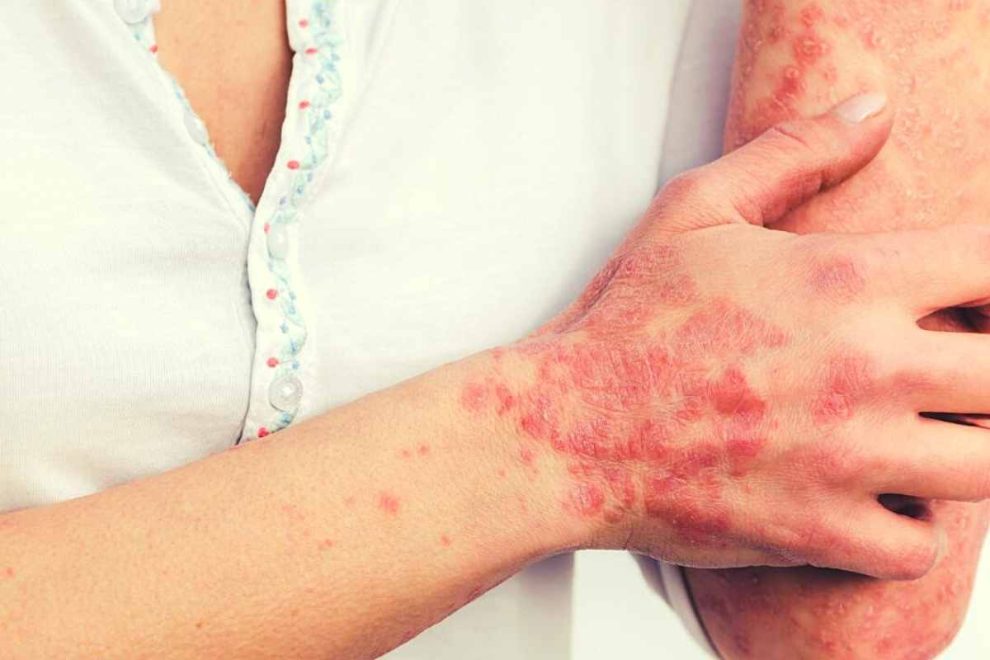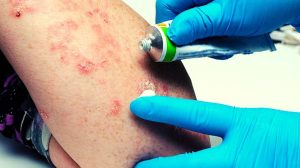If you’re struggling with psoriasis, you’re not alone. It’s a common skin condition that can be both painful and embarrassing. You may have tried various creams and ointments, but nothing seems to provide lasting relief. You may be wondering what causes psoriasis and what triggers flare-ups. Keep reading to learn more about this complex condition.
What is psoriasis?
Psoriasis is an autoimmune, chronic, non-contagious disease characterized by flare-ups at periodic intervals. As a result of the overgrowth of keratinocytes in the skin, the psoriasis skin scales due to the increased activity of those cells.
Some typical symptoms of this condition include redness, infiltration, and scaling. In this condition, the epidermis, the outer layer of the skin, becomes abnormally enlarged, and the small vessels in the skin become dilated and tortuous.
Currently, it is not known how psoriasis develops and what causes it exactly. The innate immune system of the skin is a crucial part of the body’s defenses against infection. However, sometimes this system can overreact to innocuous stimuli, leading to inflammation and tissue damage. Psoriasis may be triggered by an overreaction of the innate immune system of the skin, and it may be chronic due to abnormal functioning of the regulatory T cells.
Psoriasis is not only limited to the skin but may also affect the joints. The condition is called psoriatic arthritis, which involves inflammation of the joints like rheumatoid arthritis.
Even though psoriasis cannot be cured today, modern treatment methods can help minimize symptoms and achieve long-term remission.

Credit: healthcentral.com
What are the psoriasis causes?
Researchers have not yet been able to pinpoint the cause of psoriasis. However, some risk factors are linked to the development of this chronic skin condition. Psoriasis is thought to be an autoimmune disorder, which means that the body’s immune system mistakenly attacks healthy cells. This can be triggered by several things, including infection, stress, injury to the skin, and certain medications. Genetics also seem to play a role in who develops psoriasis, as this condition often runs in families.
What are the triggers of psoriasis?
1. Obesity
Obesity is a known risk factor for psoriasis. In fact, obese people are twice more likely to develop psoriasis than people of normal weight.
There are a few reasons why obesity may trigger psoriasis. First, excessive body fat can lead to inflammation throughout the body. This inflammation may cause the immune system to overreact and produce too many skin cells, leading to psoriasis plaques forming. Furthermore, obese individuals are more likely to suffer from conditions that increase the risk of psoriasis, such as diabetes and metabolic syndrome. Lastly, obesity can exacerbate existing psoriasis by increasing its itchiness and pain.
2. Smoking
While the exact mechanism by which smoking leads to psoriasis is not fully understood, several possible explanations exist.
One theory is that smoking damages the skin cells, making them more susceptible to inflammation and triggering the immune response that leads to psoriasis. Cigarette smoke also contains harmful chemicals that can alter the body’s immune response. Additionally, smoking can lead to reduced blood flow, impacting the skin’s ability to heal and repair itself.
Those who suffer from psoriasis should quit smoking to improve their health and prevent the condition from worsening.
3. Stressful life
Environmental factors, including stress, significantly influence psoriasis.
Stress can trigger psoriasis in some ways:
- When we’re stressed, our bodies produce more of the hormone cortisol. Cortisol can increase inflammation throughout the body, and since inflammation is a key factor in psoriasis, this can lead to flare-ups.
- Stress can weaken our immune system, making us more susceptible to infections.
- When we’re stressed, we tend to pick at our skin or engage in other unhealthy behaviors that can worsen psoriasis symptoms.

Credit: researchgate.net
4. Specific foods
For some people, certain foods can trigger a flare-up of their symptoms. While there is no one-size-fits-all list of trigger foods, there are some common culprits that you may want to avoid if you have psoriasis.
In terms of triggering flares of psoriasis, sugar is a major offender. Processed foods and sweets cause inflammation throughout the body, which can exacerbate existing skin conditions like psoriasis. If you have psoriasis, try to limit your sugar intake and opt for healthier alternatives like fruits and vegetables.
Gluten is another common trigger food for people with psoriasis. This protein is found in wheat, barley, and rye and can cause inflammation in the gut if you’re sensitive to it.
5. Excess alcohol consumption
The consumption of alcohol is known to trigger flare-ups of psoriasis. However, why does alcohol cause this effect? There are a few possible explanations. Alcohol can impair the body’s immune system, making it more difficult to fight off infections and inflammation. Additionally, alcohol can also lead to dehydration, which can exacerbate skin conditions like psoriasis. Finally, alcohol consumption can increase stress levels, and stress is also a known trigger for psoriasis flare-ups.
If you have psoriasis, it’s best to avoid alcoholic beverages or at least drink them in moderation.

Credit: onlinelibrary.wiley.com
6. Weather conditions
Weather conditions can trigger psoriasis flare-ups in some people. Cold weather and low humidity can cause the skin to dry, leading to a flare-up. In addition, sunlight can also trigger psoriasis flare-ups in some people.
7. Bacterial and viral infections
Several types of skin infections can trigger psoriasis flare-ups, including bacterial and viral infections. Staphylococcus aureus is a common bacteria that can cause skin infections. This bacterium is often found on the skin but can cause problems when it enters the body through cuts or other open wounds. People with psoriasis are more susceptible to staph infections because their skin is already inflamed.
Viral infections, such as herpes simplex virus (HSV), can also cause flare-ups.
8. Injuries to the skin
Damage to the skin triggers a series of events that may eventually lead to psoriasis. The first step is called the “Koebner phenomenon,” in which an injury to the skin causes new psoriasis lesions to form at the injury site. It’s unclear exactly why this happens, but it’s thought that some sort of signal in the skin triggers the overgrowth of new skin cells.
If you have psoriasis, even a minor cut or scrape can cause a Koebner reaction. Therefore, it is essential to take extra care of your skin and avoid any kind of injury as much as possible. If you get injured, clean the wound and protect it from further damage with a bandage.
To sum up
To conclude, psoriasis is an inflammatory skin condition that arises when the body’s immune system overreacts. As of now, it is unknown what exactly causes psoriasis, but genetics and environmental factors are believed to play a part in its development. Several triggers can cause or worsen an existing psoriasis condition, including stress, injury to the skin, infections, etc. By knowing these factors, you can avoid them.









